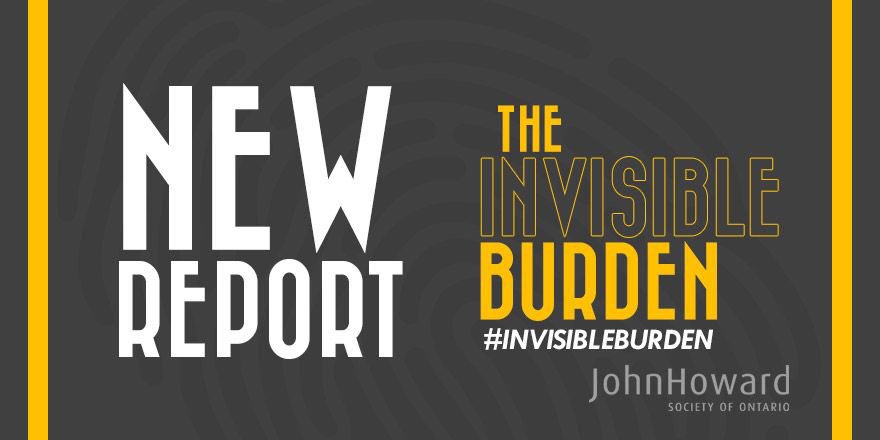February 21, 2018
(Toronto, ON) Today the John Howard Society of Ontario (JHSO) revealed the hidden but ruinous burden the criminal justice system places on police targets. Through funding from the Metcalf Foundation, JHSO released Invisible Burden, documenting the unjust impact of police record checks on peoples’ lives. The report identified best practices, leading research, and employer practices, in order to identify opportunities for reform. Additionally, JHSO launched a new website, Police Records Hub – compiling updated resources for employers, service providers, and people with various types of records.
Police record checks frequently disclose information well beyond criminal convictions; depending on the police service, mental health apprehensions, police records of suicide attempts, complaints where charges were never laid, withdrawn charges, acquittals, and even victim and witness information can be disclosed on record checks. This is disturbing news because an increasing number of Canadian organizations – employers, volunteer managers, educational institutions, licensing bodies and governments – are incorporating police record checks into their hiring and management practices.
“A police record is ruinous for far too many who don’t deserve to be unemployable for life. The John Howard Society of Ontario’s new report and Hub are great resources that can help foster rights-respecting, inclusive hiring practices” says Michael Bryant, Executive Director and General Counsel, Canadian Civil Liberties Association
Thanks to JHSO, now there is a central hub at http://policerecordhub.ca/, containing best practices, Ontario specific information, guides, and research, all located on one centralized website that can help employers, service, providers, and people with lived experience.
The Invisible Burden report includes:
- An overview of the types of records checks in Ontario, along with statistics about the prevalence of various types of records;
- An overview of other jurisdictions: how they have identified the issue; best practices or models aimed at creating rights-respecting, inclusive approaches to hiring;
- Results from surveys and interviews with large employers in Toronto;
- One-page fact sheets and infographics;
- Evidence-based policy recommendations for Ontario;
- Opportunities to effect changes that will benefit both employers and people with records, and the labour market in general
For more information on record checks, see CCLA’s report False Promises, Hidden Costs and our website at https://dev.ccla.org/recordchecks/.
About the Canadian Civil Liberties Association
The CCLA is an independent, non-profit organization with supporters from across the country. Founded in 1964, the CCLA is a national human rights organization committed to defending the rights, dignity, safety, and freedoms of all people in Canada.
For the Media
For further comments, please contact us at media@ccla.org.





